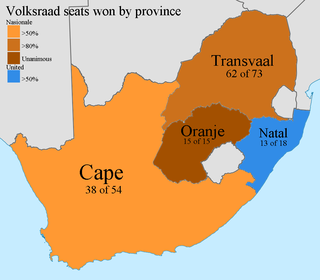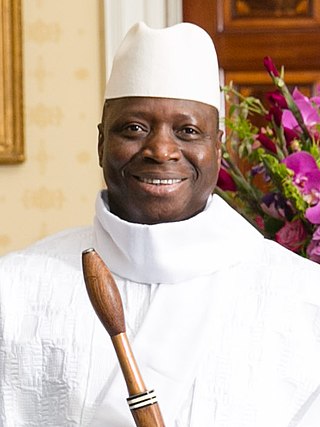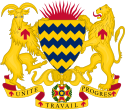
The Pan-African Union for Social Democracy is a political party in the Republic of the Congo headed by Pascal Lissouba, who was President from 1992 to 1997. It has been the country's main opposition party since Lissouba's ouster in 1997. Pascal Tsaty-Mabiala has been Secretary-General of UPADS since 2006.

Elections in Benin take place within the framework of a multi-party democracy and a presidential system. Both the President and the National Assembly are directly elected by voters, with elections organised by the Autonomous National Electoral Commission (CENA).

Elections in the Comoros take place within the framework of a multi-party democracy and a presidential system. The President and the majority of the seats in the Assembly of the Union are directly elected.

Elections in Kenya take place within the framework of a multi-party democracy and a presidential system. The President, Senate and National Assembly are directly elected by voters, with elections organised by the Independent Electoral and Boundaries Commission (IEBC).

Elections in Gabon take place within the framework of a presidential multi-party democracy with the Gabonese Democratic Party, in power since independence, as the dominant party. The President and National Assembly are directly elected, whilst the Senate is indirectly elected.

Elections in Cuba are held at municipal, provincial, and national levels. Cuba is a one-party state, with the Communist Party of Cuba being described as the "superior driving force of the society and the state" in the Constitution of Cuba, and the communist party is the only official political party. Elections in Cuba are not considered democratic because the government does not allow free and fair voting.

Elections in Niger take place within the framework of a semi-presidential system. The President and National Assembly are elected by the public, with elections organised by the Independent National Electoral Commission (CENI).

Elections in Togo take place within the framework of a presidential system. Both the President and the National Assembly are directly elected by voters. Togo is a one party dominant state with the Union for the Republic in power.

Elections in Zambia take place within the framework of a multi-party democracy and a presidential system. The President and National Assembly are simultaneously elected for five-year terms.
The Union for Democracy and the Republic is a political party in the Republic of the Congo. André Milongo, who was the country's transitional Prime Minister from 1991 to 1992, was the President of the UDR-Mwinda until his death in 2007.

General elections were held in South Africa on 30 March 1966. The result was another comprehensive victory for the National Party under H. F. Verwoerd.

The 2006 Victorian state election, held on Saturday, 25 November 2006, was for the 56th Parliament of Victoria. Just over 3 million Victorians registered to vote elected 88 members to the Legislative Assembly and, for the first time, 40 members to the Legislative Council under a proportional representation system. The election was conducted by the independent Victorian Electoral Commission.

Parliamentary elections were held in Angola on 5 and 6 September 2008, as announced by President José Eduardo dos Santos on 27 December 2007. They were the first since the 1992 general elections, which had led to the outbreak of the second phase of the Angolan Civil War, which continued until 2002.

Parliamentary elections were held in the Republic of the Congo on 24 June 2007, with a second round initially planned for 22 July 2007, but then postponed to 5 August 2007. According to the National Commission of the Organization of the Elections (CONEL), 1,807 candidates stood in the first round for 137 seats in the National Assembly. The ruling Congolese Labour Party and parties and independent candidates allied with it won 125 seats, while two opposition parties won a combined 12 seats.

General elections were held in the Northern Territory of Australia on 9 August 2008. Of the 25 seats in the Legislative Assembly, 23 were contested; two safe Labor seats were uncontested. The incumbent centre-left Labor Party (ALP), led by Chief Minister Paul Henderson won a narrow third term victory against the opposition centre-right Country Liberal Party (CLP), led by Terry Mills. Labor suffered a massive and unexpected swing against it, to hold a one-seat majority in the new parliament.

Parliamentary elections were held in the Gambia on 29 March 2012. The ruling Alliance for Patriotic Reorientation and Construction (APRC) won 43 of the 48 elected seats.
The electoral system of Turkey varies for general, presidential and local elections that take place in Turkey every five years. Turkey has been a multi-party democracy since 1950, with the first democratic election held on 14 May 1950 leading to the end of the single-party rule established in 1923. The current electoral system for electing Members of Parliament to the Grand National Assembly has a 7% election threshold.

General elections were held in Samoa on 4 March 2016 to determine the composition of the 16th Parliament. Two parties contested the election, the ruling Human Rights Protection Party (HRPP), led by Prime Minister Tuilaʻepa Saʻilele Malielegaoi, which had been in government for most of the time since 1982 and the Tautua Samoa Party (TSP), led by Opposition Leader Palusalue Faʻapo II.

Parliamentary elections were held in Georgia on 31 October and 21 November 2020 to elect the 150 members of Parliament. The ruling Georgian Dream party led by Prime Minister Giorgi Gakharia won re-election for a third term in office, making it the first party in Georgian history to do so. The elections also saw a record number of opposition parties elected to parliament.

General elections were held in Botswana on 23 October 2019 to elect MPs and local government councillors. Despite a high profile split in the ruling Botswana Democratic Party (BDP) in May 2019 when former President Ian Khama left the party and switched his support to the new Botswana Patriotic Front, the BDP's vote share increased to almost 53% as the party won 38 of the 57 elected seats in the National Assembly, a gain of one compared to the 2014 elections. The elections were the twelfth straight victory for the BDP.


















